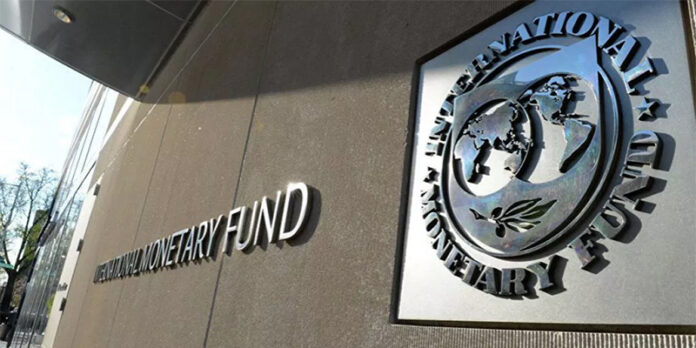May 6, 2021

According to the Tunisian government, the IMF would have welcomed Tunisia’s macroeconomic reform program. The meeting with the IMF was organized with the aim of obtaining a loan covering sovereign debt, close to $4 billion.
A Tunisian delegation visited Washington on May 3 to justify the country’s demand for debt rescheduling. Tunisia was reportedly represented by Economy Minister Ali Kooli and Central Bank Governor Marouane Abassi.
Therefore, the Tunisian delegation claimed that the program included a review of the subsidy and salaries of public officials. Promises that suit the interests of the financial authority. However, Tunisia, which has 800,000 public servants, could face another economic shock if these measures were adopted.
A source close to the file provided the Journal du Dimanche with a copy of the latest draft of the reforms in question. The 26-page document explains at length, at large and through the objective reasons of the Tunisian financial crisis. Nevertheless, very few concrete measures are planned.
Is Covid-19 Really Responsible?
In particular, the document reads: “The short-term macroeconomic outlook is bleak due to the third wave of the Covid-19 pandemic,” notes the Tunisian government. Admittedly, the Covid-19 pandemic has damaged the supposed economic development efforts in Tunisia. One could then wonder if the success of the vaccination campaign would mean a speedy recovery for the famous “citizen’s basket”.
In any case, this is what the government certifies in this draft. This is undoubtedly an argument repeated over and over again by the Tunisian delegation in Washington. The second argument is the search for efficiency in government action. Concretely, one could judge the intervention of the State according to the rise of the vaccination campaign, which seeks to cover 50% of the general population during 2021.
This is a rather ambitious statement. If the IMF extends $ 4 billion to Tunisia, it could not be in the hope that the country will repay them quickly. However, vaccination would not necessarily mean the resumption of production, or even its increase. The Tunisian sovereign debt report of June 2019 certifies $ 26.8 billion in debt, up from 21.1 in 2018. Clearly, Tunisia has been experiencing a financial plunge for years. The coronavirus is therefore not the only culprit in the crisis.
The Chimera of Tunisian Realism
Which brings us to the issue of governance. Beyond politics, the Tunisian administration is not effective. Assuming that the opposite is true in the public health sector can be a euphemism for the average citizen. Moreover, the IMF makes it clear that promises of reforms will be difficult to maintain. So, on the margins of this paradigm, what leads the International Monetary Fund to believe otherwise?
The government document presents radical proposals. These include the encouragement of layoffs in the private sector, early retirement programs and part-time work. According to Reuters, which reported on another more recent document, the state plans to employ unemployed people at 50% of the minimum wage, or 189 Tunisian dinars per month.
Consequently, the Tunisian General Labor Union (UGTT) reneged on its agreement with the government. This agreement provided a carte blanche for the Tunisian government delegation to negotiate the terms of the debt syndication. It would not be the first time that the UGTT has reneged on its promises. The union is said to be the cause of the general outcry that the government has known since the revolution. If public opinion is to be believed, this time will be no different.
Nevertheless, the government of Mechichi has several irons in the fire. And even if political debates are part of it, governing the country remains the priority, by standards and by clauses. Yet another wave of strikes would only kill the reform program in the bud.
What Solutions for an Economy on its Knees?
Although the program agreed with the IMF benefits Tunisia very little in the long term, what about its urgency? It would be surreal for government employees not to receive their salary. However, this hypothesis has been present since the start of the recession in 2016.
In all likelihood, the Tunisian state will not have much to lose by defaulting on its debt. But this is a barrier the government would never be prepared to cross. The economic stalemate is an indisputable reality. The government promises to “negotiate innovative measures aimed at reducing the wage bill”, but the UGTT would not let it happen, at the risk that more strikes would forever bury the Tunisian dream of economic recovery.
In effect, the Tunisian ego shrouded in patriotism would prevent some populations from really considering themselves in the quagmire – understand, the new bourgeoisie. On the other hand, the silent majority is already in a dead end. These facts could be omitted or accepted, but in either case, no one expects a change from the Tunisian “elites” any longer. The state would probably have to start considering small changes of which it would be capable. Not that President Kaïes Saïed is right, but corruption plagues the administration and hinders development.
Finally, which corruption harms the Tunisian economy the most? Are they politicians and businessmen, as the “experts” in the media (and the President, whenever a microphone is within reach) automatically repeat? Or is it petty corruption? There is not a Tunisian who could contradict a simple observation. Corruption also benefits state employees, security, public administration, customs and even health, given the current context. It might be wiser to tackle these “real issues”, instead of debating the country’s macroeconomics (or playing the round)… in Washington.








